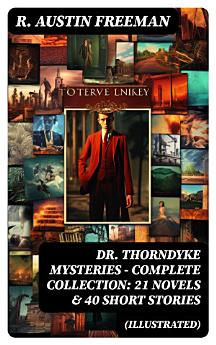DR. THORNDYKE MYSTERIES – Complete Collection: 21 Novels & 40 Short Stories (Illustrated)
R. Austin Freeman
Dec 2023 · DigiCat
Ebook
860
Pages
family_home
Eligible
info
reportRatings and reviews aren’t verified Learn More
About this ebook
R. Austin Freeman's "Dr. Thorndyke Mysteries – Complete Collection" masterfully compiles 21 novels and 40 short stories featuring the brilliant forensic detective Dr. John Thorndyke. Celebrated for its intricate plots and pioneering use of forensic science, Freeman's work transcends conventional mystery, employing a narrative style that deftly combines intellectual rigor with engaging storytelling. The collection showcases a meticulous attention to detail and a narrative structure that navigates the complexities of crime investigation in the early 20th century, perfectly encapsulating the burgeoning fascination with science and technology during that era. R. Austin Freeman, a trailblazer in the genre, drew inspiration from his background in medicine and legal expertise. His experiences as a medical doctor informed the character of Thorndyke, who embodies the application of scientific method to criminal inquiry. Freeman's career was marked by a desire to elevate the detective story to an art form, and his dedication to realism and forensic detail paved the way for future mystery writers, integrating scientific principles with literary finesse. This collection is an essential addition for both aficionados of classic detective fiction and those interested in the evolution of the genre. Freeman's intricate plots and richly textured language offer readers not just entertainment but an insightful commentary on morality, justice, and the human condition, making it a must-read for anyone who appreciates the depth of literary craftsmanship.
About the author
Renowned for his contributions to the genre of crime fiction, Richard Austin Freeman (1862–1943) was a British writer most famous for the creation of Dr. John Thorndyke, a medical jurispractitioner. Freeman's works, particularly the collections and novels focused on Dr. Thorndyke, have been well-regarded for their meticulous attention to the scientific and forensic details of criminal investigations, distinguishing his literary style within the field of detective fiction. Despite originally pursuing a career in medicine, Freeman shifted to writing after his health declined, finding success with his fictional detective counterpart. The character of Thorndyke was revolutionary for his time, employing cutting-edge scientific techniques that predated similar methods used by real-life forensic scientists. Among his numerous works, 'DR. THORNDYKE MYSTERIES – Complete Collection: 21 Novels & 40 Short Stories (Illustrated)' stands as a testament to Freeman's prolific output and his significant impact on the detective genre. His work preceded and influenced other key writers, such as Agatha Christie, and he is noted for pioneering the 'inverted detective story' format, which presents the audience with the crime and perpetrator initially, subsequently focusing on the detective's process. Freeman's dedication to the craft and innovative storytelling continues to be celebrated by enthusiasts of detective fiction.
Rate this ebook
Tell us what you think.
Reading information
Smartphones and tablets
Install the Google Play Books app for Android and iPad/iPhone. It syncs automatically with your account and allows you to read online or offline wherever you are.
Laptops and computers
You can listen to audiobooks purchased on Google Play using your computer's web browser.
eReaders and other devices
To read on e-ink devices like Kobo eReaders, you'll need to download a file and transfer it to your device. Follow the detailed Help Center instructions to transfer the files to supported eReaders.








